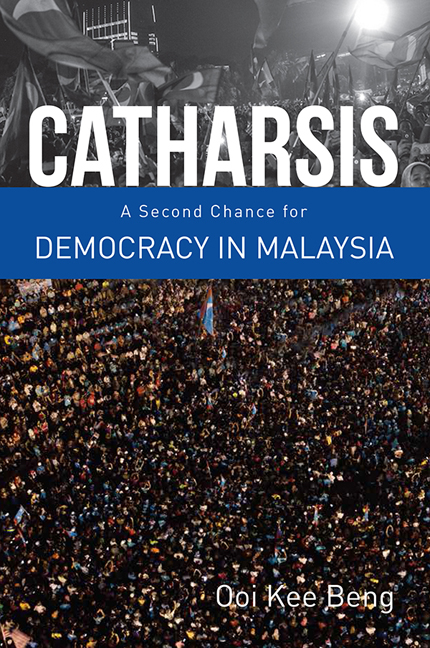Book contents
- Frontmatter
- Contents
- Foreword
- 1 Introduction – Malaysia's Future Is Redeemed
- Before Pakatan Harapan
- 2 After All These Years, Malaysia Is Still Held Hostage
- 3 Beyond the Nationalism Trap
- 4 Federating Malaysia — A Continuous and Troubled Process
- 5 Funeral for a True Son of Penang
- 6 Let's Work Out What Malaysia Is Good For
- 7 The Unity Fetish
- 8 When the National Narrative Loses the Script
- 9 Let's Be Cosmopolitan and Leave Multi-ethnicity Behind
- 10 Noses Don't Grow Back
- 11 Mahathir's Bersatu is Best Understood as an NGO
- Before 9 May 2018
- With Mahathir at the Helm
- Beyond 9 May 2018
- About the Author
10 - Noses Don't Grow Back
from Before Pakatan Harapan
Published online by Cambridge University Press: 12 February 2019
- Frontmatter
- Contents
- Foreword
- 1 Introduction – Malaysia's Future Is Redeemed
- Before Pakatan Harapan
- 2 After All These Years, Malaysia Is Still Held Hostage
- 3 Beyond the Nationalism Trap
- 4 Federating Malaysia — A Continuous and Troubled Process
- 5 Funeral for a True Son of Penang
- 6 Let's Work Out What Malaysia Is Good For
- 7 The Unity Fetish
- 8 When the National Narrative Loses the Script
- 9 Let's Be Cosmopolitan and Leave Multi-ethnicity Behind
- 10 Noses Don't Grow Back
- 11 Mahathir's Bersatu is Best Understood as an NGO
- Before 9 May 2018
- With Mahathir at the Helm
- Beyond 9 May 2018
- About the Author
Summary
It is very sad that the state of Penang is being ignored in the 11th Malaysia Plan (2016–20). None of the infrastructure projects the Penang government presented for financial support has been accepted by the federal government. Putrajaya seems to imagine that Malaysia will reach advanced nation status by 2020 without Penang's contribution; instead KL, Johor Bahru, Kuching and Kota Kinabalu are declared the growth catalyst cities, and will therefore receive central support.
Penang Chief Minister Lim Guan Eng was right to be outraged, as all Penangites are.
They do not seem surprised by the fact that the federal government is willing to lower the country's chances of achieving advanced nation status just for the pleasure of punishing its stepchild state.
Cutting your nose to spite your face is not something sane people do.
Among the first things to happen following Malaysia's first general elections in 1964 was the suspension of local government elections. This affected Penang greatly. Local government in the state had been responsible ‘in advancing progressive policies such as social housing and major public infrastructure projects such as drainage, public toilets (a novel idea at that time), mobile clinics and even a dam.’ (See Penang Monthly'scover story for April 2015, p. 35).
This was followed by the steady withdrawal of the free port status that Penang had always enjoyed. This spiked further the unemployment that the state was already suffering in the late 1960s, exacerbated by the crisis that followed the huge devaluation of the British Pound on 18 November 1967. The Penang riots of 1968 were very much a result of severe economic dejection.
We forget today how bad things actually were for Penang back in the days and how many of the state's sons and daughters had to leave for what they could only hope were greener pastures either to the Klang Valley or beyond.
The depressed socioeconomic situation of the times sufficiently explains the Gerakan phenomenon – how this party, Partai Gerakan Rakyat, founded only on 24 March 1968 by a hotchpotch of failing politicians and idealist academics, could take power in Penang in May 1969, less than 14 months after it came into being.
- Type
- Chapter
- Information
- CatharsisA Second Chance for Democracy in Malaysia, pp. 34 - 36Publisher: ISEAS–Yusof Ishak InstitutePrint publication year: 2018



